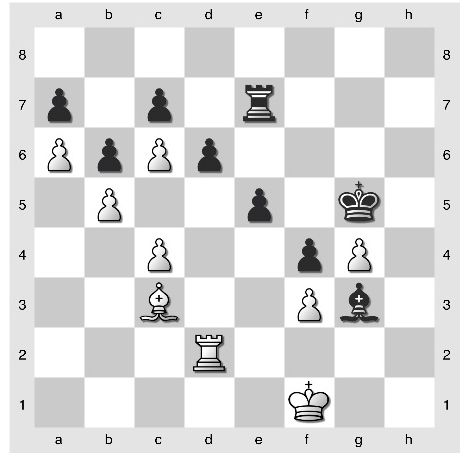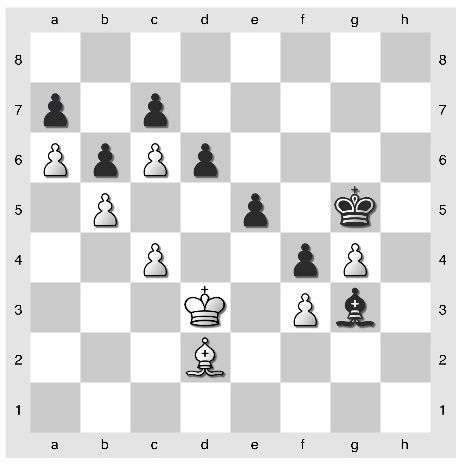Well, this is really nothing to get excited about, but last night I finally won against Shredder 12 (full strength) on my Mac. The conditions were game in 10 minutes, with no time increment.
You might say, “Wait a minute! Aren’t you the guy who wrote an article in Chess Life extolling the Bryntse Variation (Queen Sac Variation) in the Sicilian Grand Prix as a great anti-computer line? So what’s the big deal about winning one game against the computer?”
Well, yes, that was a great line to play against Fritz 9, but unfortunately Shredder 12 varies its openings so much that I have gotten only one chance to play 1. e4 c5 2. f4 d5 3. Nf3 de 4. Ng5 Nf6 5. Bc4 Bg4 6. Qxg4! against it. And I managed to lose that game anyway, although it was a good battle.
My game against Shredder last night broke absolutely no new ground. I just played the usual anti-computer strategy of blockade, trade queens, avoid complications. It should have led to a draw, but Shredder lost on time. That was the only thing that surprised me. I would have thought that the computer would be programmed to never lose on time. If it has 10 milliseconds left, just program it to move in 5 milliseconds. I certainly never came anywhere close to winning a game on time against Fritz.
But Shredder seems to be more casual with the clock than Fritz was. I was already surprised when it got down to 25 seconds and I still had 2 minutes left, but I assumed it would just go into overdrive. Nope. It didn’t really go into overdrive until it had 1 second left, and then it managed to make 11 moves in a row in 0 seconds each. But apparently it was still counting fractions of a second, because on the eleventh move it reported that it had run out of time.
Ironically, the position where it ran out of time was the first time in the entire game when it had a winning advantage! Here is how it happened.
Black to move.
Here White (the computer) has just played 50. Rd2. According to Shredder, the best move for Black here is 50. … e4! After 51. Rd5+ Kg6 52. fe Rxe4 Shredder gives Black a small advantage, but it’s not sufficient to win. One might say that Black has the better of the equality, because if White makes a mistake (which is not inconceivable for a computer with only 1 second left on its clock) Black can still win.
However, I was blitzing my moves too, and didn’t think of 50. … e4. I played the automatic 50. … Rh7, seizing the only open file, which also should be good enough to draw. Now White played 51. Ke2 Rh2+ 52. Kd3 and I traded rooks with 52. … Rxd2+??
This is the worst thing Black could do in the position. As long as Black has the rook and it is in control of the h-file, there is nothing White can do to hurt him. The passed g-pawn is under lock and key, and none of the bishop sacrifices at e5 or d6 or b6 will ever work. Take the rooks off the board, though, and Black is in deep trouble. All of the aforementioned sacrifices become possible, and White also has ideas of just marching his king up on the white squares.
Conclusion: After 53. Bxd2 Black is completely busted.
Black to play. A good time to claim a time forfeit.
My intention here was to play 53. … Bf2, which loses immediately to 54. Bb4! The threat is to sac on d6, and the only way that Black can stop it is to play 54. … Bc5. But then 55. Bxc5 dc 56. Ke4 leads to a king and pawn endgame that is completely won for White.
So Black’s only hope here is to play 53. … Kf6, in order to get the king back in time to protect the d-pawn. But it’s still an elementary win for White: 54. Ke4 (54. g5+ is also good if you want to get fancy) Ke6 55. g5 Bh4 56. g6 Bf6 57. Bc3 Bg7 58. Be1 Bf6 59. Bf2, zugzwang. Black’s bishop cannot keep an eye on both the g7 square and the h4 square.
Fortunately, in the above position a message popped up onscreen: “White has run out of time.” That’s right, the computer called its own flag. What a nice, honest machine!
And so I got my undeserved victory. But I’m not apologizing. Undeserved victories are the sweetest kind! If there’s any lesson here, it’s “Don’t mindlessly exchange pieces, even in a time scramble.”




